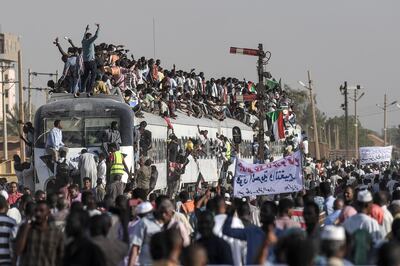Hundreds of protesters arrived on a packed train in Khartoum on Tuesday to join a weeks-long sit-in outside army headquarters, as a top US official reiterated Washington's backing for the country's military council to hand over power to a civilian government.
But African leaders meeting in Cairo insisted the transition needs more time, urging the African Union to extend its end of April deadline by three months to hand power or face suspension from the bloc.
Sudanese protesters vowed to continue their struggle for a civilian government to take over after the army ousted long-time President Omar Al Bashir on April 11, after months of mass protests.
The demonstrations first broke out in December in the northeastern Sudanese town of Atbara.
On Tuesday, a train from the same town, overflowing with flag-waving demonstrators, chugged through north Khartoum's Bahari railway station before winding its way to the protest site, according to AFP.

Protesters perched on the roof of the train, chanting "freedom, peace, justice" as crowds of supporters, who had waited for hours, greeted them as the procession came to a stop outside the army headquarters in central Khartoum.
Calling for retribution for those killed during Mr Al Bashir's rule, protesters chanted "blood for blood, we will not accept compensations".
The protests that broke out in Atbara swiftly mushroomed into nationwide demonstrations against Mr Al Bashir's iron-fisted rule, finally leading to his ousting by the army.
Under Mr Al Bashir, officials say at least 65 people were killed in protest-related violence since December.
But initial jubilation at the end of the president’s three-decade reign quickly turned to anger over the military council's plan to keep power for a two-year transition period.
World powers have urged the council to cede power. The military council leading the transition have taken steps to meet several of the key demands of protesters and said that the unions that led the campaign could nominate key officials including a prime minister. But they have warned that moving to an all civil administration too quickly could plunge the country into chaos and even civil war.
"We support the legitimate demand of the people of Sudan for a civilian-led government, and we are here to urge and to encourage parties to work together to advance that agenda as soon as possible," top US State Department official Makila James said on Tuesday.
"The people of Sudan have made their demand very clear," she said.
"We want to support them in that as the best path forward to a society that is respectful of human rights, that respects the rule of law and that would be able to address this country's very serious issues."
During her ongoing trip, Ms James met the country's military council chief Lt Gen Abdel Fattah Al Burhan and several other officials.
Ms James, however, reiterated that talks with Khartoum over removing Sudan from Washington's list of state sponsors of terrorism remain suspended.
"That is a conversation that we are not able to engage at the moment," she said.
"All of that is suspended as we try to assess what is the reality on the ground, what is the way forward."
Washington has kept Sudan on its terrorism list, even as it lifted decades-old sanctions in October 2017. The military council said it was sending a delegation to Washington to negotiate on the terror designation.

In an interview with the BBC, broadcast on Tuesday, Lt Gen Al Burhan said force would not be used against the protesters.
"We do not pose any threat against them," he said. "We just want food and petroleum supplies to flow and the movement to become normal."
But protesters vowed to stand their ground at the barricades. Protest leaders from the Alliance of Freedom and Change have suspended talks with the military council, accusing it on Sunday of being part of the regime put in place by Mr Al Bashir.
Late on Monday, the military council tried to ease the tensions, saying the demands made by the Alliance for Freedom and Change, the umbrella group leading the protest movement, were being examined.
"The alliance has presented its proposal ... which is now being studied along with the visions of other political forces," council spokesman Shamseddine Kabbashi told reporters.
He said the council "will communicate with everyone to reach a middle ground".
But groups of journalists, doctors, engineers and veterinarians also marched on Tuesday in Khartoum to keep up the pressure for a transfer of power to civilian rule.
Hundreds of protesters joined a sit-in outside an army building in the eastern border town of Kassala, demanding that those responsible for killing protesters be brought to justice.

